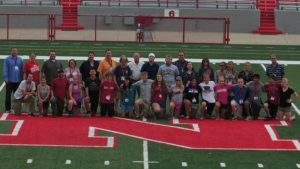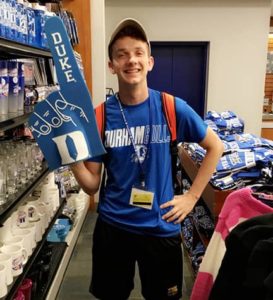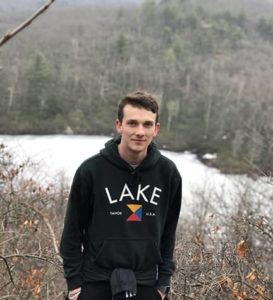
“I first heard about Economics for Leaders back in high school in Kansas, so I applied on a whim to the week-long program at the University of Nebraska and it ended up being one of the most incredible experiences of my life. After that, I never wanted to stop.”
This is how Broderick Topil, FTE ’14, explains his first encounter with TFAS high school division, the Foundation for Teaching Economics (FTE), seven years ago. Topil attended the Economics for Leaders (EFL) program in the summer of 2014, traveled to Washington for the D.C. Leadership Academy program the following summer, and became a program coordinator shortly after that. Now he’s teaching high school math classes with Teach for America and is completing his master of education with courses offered through FTE’s programs for teachers.
An Introduction to Economics
Prior to attending EFL in 2014, Topil had never studied economics. He believed economics was inaccessible to him as a kid from a small town in Kansas. It seemed like a topic exclusively for the “elite members of society” to discuss, something that was “too scholarly” for most people. In general, he just didn’t think economics was for him. However, he realized the importance of economics and leadership programs for college admissions, so he decided to apply.

It’s a good thing he did, because he really found his niche. He was struck by the expert combination of economics and leadership to teach high schoolers the economic way of thinking and remembers thinking to himself, “How have I never been introduced to this? Economics is so cool!”
Topil fondly remembers each aspect of his first summer with FTE, but the biggest takeaway for him was learning to launch himself headfirst into each activity in order to understand what makes leaders effective. “It takes trust and courage to be a leader,” he said, “so realizing that and overcoming that fear with the help of the facilitator was a real inflection point in my personal growth. After that, I was sold.”
It takes trust and courage to be a leader, so realizing that and overcoming that fear with the help of the facilitator was a real inflection point in my personal growth. After that, I was sold.” – Broderick Topil, FTE ’14
Taking the Next Step

While still in high school, FTE’s economics professors helped Topil learn and grow, pushed him to overcome his hesitations, and showed him how to think about the world differently. This exposure to the world of economics struck a chord with him, so he decided to return as a program coordinator. So far, he has worked as a coordinator for 13 programs, and he is looking forward to continuing in this capacity. Program coordinators are an integral part of the summer programs curriculum. They assist in leadership instruction, oversee the daily life of the participants, and serve as a mentor to the students by motivating them, reinforcing the lesson objectives, providing guidance and camaraderie, and enforcing the program’s rules of conduct.
“Now that I’m a program coordinator, I see myself in every high school student who comes through,” Topil said. “They’re so willing to put themselves in an environment where half the time, they’re sitting in college-level economics classes, and the other half they’re doing leadership activities, which you wouldn’t think go together but totally do.”
Topil enjoys guiding students to have experiences similar to his own and helping them realize their potential. He believes the program is perfect for students with ambitious goals and dreams who want to better themselves and that FTE is the tool that helps them realize it.
As a program coordinator, he is proud to have a role in fostering positive, fun and engaging learning environments where he can challenge students to step out of their comfort zones and experience personal growth.
Lasting Influence
This exposure to economics encouraged Topil to study the subject in college and helped him feel more prepared going into his freshman year. He earned his bachelor’s degree in economics, international studies and political science at Northwestern University, then decided to pursue his master’s degree in education and join Teach for America.
Topil is currently a high school special education math teacher in Rhode Island at a school without an economics curriculum. Emboldened by his experience with FTE, Topil is designing a combined social studies and math course that relies on economics. Using the hands-on, interactive learning approach FTE is known for, he is tailoring it to his own students before fully developing it for the rest of the school.

In addition to teaching, Topil is finishing his master’s in education with courses offered through FTE. This semester, he is studying the “Economics of Disasters.” He shared that one compelling aspect of the program is the opportunity to study what interests him while learning how to apply it to real life and how to teach others about it.
“It’s really neat because I can take that way of thinking and figure out how to use it in a classroom,” Topil said. “I’m learning how to implement it in a curriculum and utilizing my own knowledge and background. I’ve been able to transfer this to other aspects of my life too, especially as I’m creating my own curriculum for a new class.”
Among the 17 programs Topil has participated in so far, he recently attended a three-day seminar in Ohio on international trade, the economics of disasters and the federal budget, where he learned from the instructors he works with during the summer as a program coordinator.
This interconnection has given Topil a “full circle” moment. He, along with many other program participants, formed lifelong relationships through FTE. He is still friends with one student from his first program in 2014, and he developed a close friendship with another alumna he met in his Teach for America cohort.
The best thing that’s come out of my involvement with FTE in all respects is that I’ve created this massive network of people who all have one shared understanding, and that is the economic way of thinking. I just feel very at home with them.” – Broderick Topil, FTE ’14
“The best thing that’s come out of my involvement with FTE in all respects is that I’ve created this massive network of people who all have one shared understanding, and that is the economic way of thinking,” Topil said. “They’ve gone through the FTE programs, I’ve done programs with them, some are my students, others are the staff. I know so many of these people who have gone through FTE programs, and I just feel very at home with them.”
FTE’s Impact
When asked why he would recommend FTE to other students or teachers, Topil simply said, “It expands your way of thinking and challenges the ideas and norms you consider to be true.”

He explained the life-changing capacity of economic reasoning principles to provide a type of power that not many other people have. FTE uses these five Economic Reasoning Propositions as a toolkit for understanding the basic principles that guide economic decision-making.
Topil recommends the program to students because it expands their potential and gives them a comparative advantage: a different way of thinking and enhanced leadership skills. He also believes that all teachers – not just economics teachers – can benefit from FTE because of the engaging lessons, in-depth curriculum and hands-on activities that can give them a fresh perspective.
Thanks to the supportive nature of FTE, Topil feels empowered to communicate economic concepts more effectively to his students and incorporate real-life examples in his classroom.
“I really do feel like the whole trajectory of my life has expanded because of FTE,” Topil said. “I’ve really loved being involved in the FTE family throughout all aspects of my connection to the organization. It’s made me feel like I can do anything because it’s given me a unique skillset. You need a good economics and leadership background to be an effective change-maker, and that’s all I really want to do in my life – create positive change.”
I really do feel like the whole trajectory of my life has expanded because of FTE. You need a good economics and leadership background to be an effective change-maker, and that’s all I really want to do in my life – create positive change.” – Broderick Topil, FTE ’14
To the supporters who have generously donated to make TFAS’s high school programs like the ones he has completed possible, Topil shares these words of gratitude:
“Thank you for allowing the space for this novel idea to grow and come to fruition on its own. The staff have done an exceptional job of developing a solid economics curriculum and a solid leadership curriculum where they let their teachers make it their own. FTE has grown so much in the past five years and I feel like I’ve seen the curriculum and the leadership develop, and none of that would be possible without you, the donors. The reality is that you’re giving us this space to challenge ideas and challenge norms, and that’s a good thing. FTE is a place where you’re able to grow and push yourself because your ideas are constantly being challenged. Thinking critically is the only way you can grow as a person, and that’s what FTE facilitates.”

